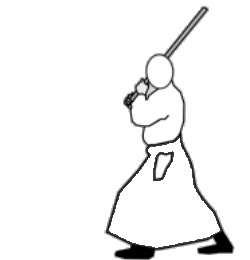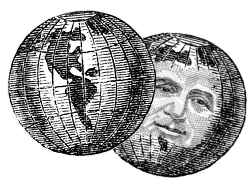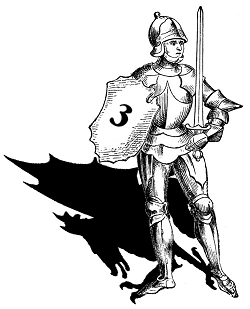 The latest JCS features a piece by Christopher Curtis Sensei about the experience of achieving mastery in Aikido. It seems he spent fifteen years cutting bokken (an exercise with wooden swords, don’t ask me), becoming very proficient technically but never satisfying the old Sensei. Finally he despaired and stopped trying; at which point, of course, he made the required breakthrough. He needed to stop thinking about it. You do feel that his teacher could perhaps have saved him a few years if he had just said so explicitly – but of course you cannot achieve the state of not thinking about something directly and deliberately. Intending to stop thinking about a pink hippo involves thinking about a pink hippo; you have to do something else altogether.
The latest JCS features a piece by Christopher Curtis Sensei about the experience of achieving mastery in Aikido. It seems he spent fifteen years cutting bokken (an exercise with wooden swords, don’t ask me), becoming very proficient technically but never satisfying the old Sensei. Finally he despaired and stopped trying; at which point, of course, he made the required breakthrough. He needed to stop thinking about it. You do feel that his teacher could perhaps have saved him a few years if he had just said so explicitly – but of course you cannot achieve the state of not thinking about something directly and deliberately. Intending to stop thinking about a pink hippo involves thinking about a pink hippo; you have to do something else altogether.
This unreflective state of mind crops up in many places; it has something to do with the desirable state of ‘flow’ in which people are said to give their best sporting or artistic performances; it seems to me to be related to the popular notion of mindfulness, and it recalls Taoist and other mystical ideas about cleared minds and going with the stream. To me it evokes Julian Jaynes, who believed that in earlier times human consciousness manifested itself to people as divine voices; what we’re after here is getting the gods to shut up at last.
Clearly this special state of mind is a form of consciousness (we don’t pass out when we achieve it) and in fact on one level I think it is very simple. It’s just the absence of second-order consciousness, of thoughts about thoughts, in other words. Some have suggested that second-order thought is the distinctive or even the constitutive feature of human consciousness; but it seems clear to me that we can in fact do without it for extended periods.
All pretty simple then. In fact we might even be able to define it physiologically – it could be the state in which the cortex stops interfering and let’s the cerebellum and other older bits of the brain do their stuff uninterrupted – we might develop a way of temporarily zapping or inhibiting cortical activity so we can all become masters of whatever we’re doing at the flick of a switch. What’s all the fuss about?
Except that arguably none of the foregoing is actually about this special state of mind at all. What we’re talking about is unconsidered thought, and I cannot report it or even refer to it without considering it; so what have I really been discussing? Some strange ghostly proxy? Nothing? Or are these worries just obfuscatory playing with words?
There’s another mental thing we shouldn’t, logically, be able to talk about – qualia. Qualia, the ineffable subjective aspect of things, are additional to the scientific account and so have no causal powers; they cannot therefore ever have caused any of the words uttered or written about them. Is there a link here? I think so. I think qualia are pure first-order experiences; we cannot talk about them because to talk about them is to move on to second-order cognition and so to slide away from the very thing we meant to address. We could say that qualia are the experiential equivalent of the pure activity which Curtis Sensei achieved when he finally cut bokken the right way. Fifteen years and I’ll understand qualia; I just won’t be able to tell anyone about it…







 Let’s ask a stupid question that may not even be answerable. How many qualia are there? It is generally assumed, I think, that this is like asking how long is a piece of string: that there is an indefinite multiplicity of qualia, that in fact, for every distinguishable sensation there is a matching distinct quale.
Let’s ask a stupid question that may not even be answerable. How many qualia are there? It is generally assumed, I think, that this is like asking how long is a piece of string: that there is an indefinite multiplicity of qualia, that in fact, for every distinguishable sensation there is a matching distinct quale.